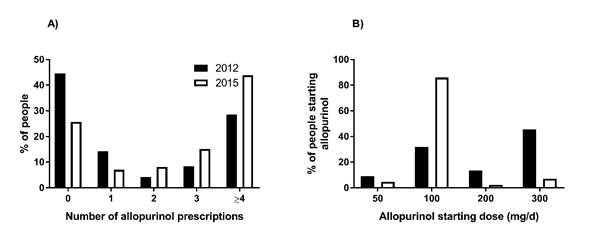Session Information
Date: Monday, October 22, 2018
Title: Metabolic and Crystal Arthropathies – Basic and Clinical Science Poster I
Session Type: ACR Poster Session B
Session Time: 9:00AM-11:00AM
Background/Purpose: The majority of gout management occurs in primary care and may be suboptimal. While community based clinical trials have reported improvements whether such improvements can be replicated in routine clinical care is unknown. The aim of this study was to determine the effects of a package of care for (POC) gout in a real life primary care setting.
Methods: A POC was developed reflecting current gout management guidelines including patient education, a structured approach to the management of gout flares and urate lowering therapy (ULT) and screening for co-morbidities. An audit of gout management in a single rural general practice was undertaken before (2012) and after (2015) introduction of the POC.
Results: In 2012 one-hundred and twenty people with gout and in 2015 one-hundred and seventy one people with gout were identified. After the introduction of the POC more people with gout were prescribed ULT (79/120 (65.8%) vs. 127/171 (74.5%); p=0.12) and there was a significant increase in the median (IQR) number of prescriptions per individual over the 12 month period (1 (0-4) vs. 3 (0-4) p=<0.001)(Figure). There was a significant increase in the number of individuals commenced on allopurinol ≤100mg daily and a corresponding decrease in the number commenced on ≥200mg daily (p<0.001)(Figure). There was a significant increase in the frequency urate testing between 2012 and 2015 ((median (range) 1 (0-3) vs 2 (0-10) respectively p<0.001). Of those individuals who had at least one urate measurement the proportion of individuals who never achieved target urate reduced from 43/67 (64.2%) in 2012 to 52/133 (39.1%) in 2015; p=0.001. With the exception of smoking, screening for important co-morbidities improved significantly after introduction of the POC. Of the 67 individuals who had a urate test in 2012 none received a ULT dose increase despite urate being above target in 46 instances. Of the 133 individuals who had a urate tested in 2015, 34 had at least one increase in allopurinol dose and of the 99 who were not dose escalated 28 were at target urate.
Conclusion: A structured POC can improve gout management in primary care although allopurinol dose escalation remains challenging.
Figure: Differences between 2012 and 2015 with regards to A) number of allopurinol prescriptions and B) allopurinol starting dose
To cite this abstract in AMA style:
Stamp LK, Chapman PT, Hudson B, Hamilton G, Judd A. The Challenges of Managing Gout in Primary Care: Results of a Best Practice Audit [abstract]. Arthritis Rheumatol. 2018; 70 (suppl 9). https://acrabstracts.org/abstract/the-challenges-of-managing-gout-in-primary-care-results-of-a-best-practice-audit/. Accessed .« Back to 2018 ACR/ARHP Annual Meeting
ACR Meeting Abstracts - https://acrabstracts.org/abstract/the-challenges-of-managing-gout-in-primary-care-results-of-a-best-practice-audit/

